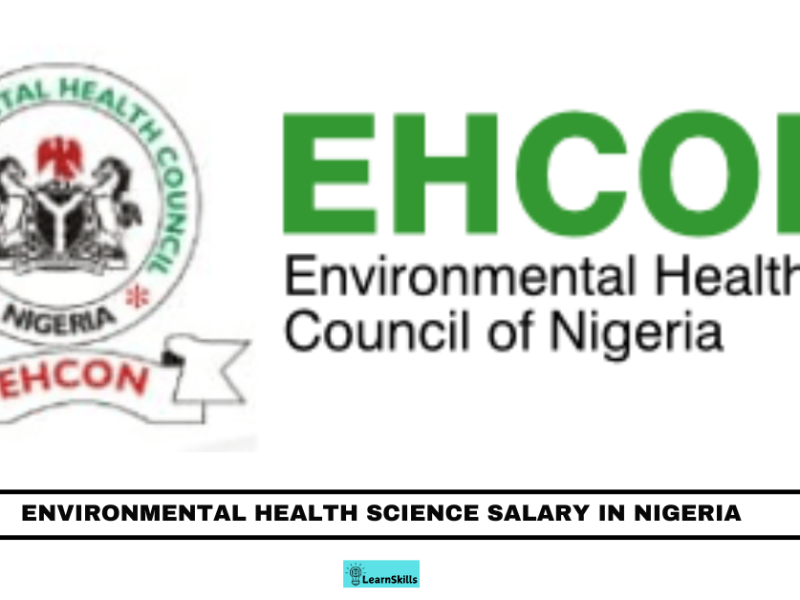If you’re considering a career in environmental health science in Nigeria, it’s essential to understand the financial landscape.
The average salary for professionals in this field can vary significantly. For example, an environmental health technician can earn about ₦83,000 monthly. Meanwhile, an Environmental Health & Safety (EHS) Manager can make around ₦3,400,000 annually.
Salaries can vary based on experience and specific roles within environmental health. Entry-level positions start between ₦34,608 and ₦127,969 net monthly.
As you gain experience and expertise, your earning potential can increase significantly, especially in managerial roles.
Educational Pathways in Environmental Health Science
Pursuing a career in environmental health science requires a solid educational foundation. You can explore various degree programs and professional development options to enhance your skills and knowledge.
University Programs
To start, you should consider obtaining a degree in environmental health science or a related field. Many universities in Nigeria offer Bachelor’s and Master’s degree programs.
These programs often cover subjects such as:
- Environmental health principles
- Toxicology
- Epidemiology
- Public health
Hands-on training and internships can also be part of your education. This experience is crucial for applying your knowledge in real-world situations. Look for institutions that have partnerships with health organizations for better practical exposure.
Professional Development and Certification
After your degree, professional development is key to advancing in this field. Certifications can enhance your qualifications and job prospects.
Organizations like the Institute of Environmental Science and Technology offer courses and professional certifications. These programs focus on skills like risk assessment and environmental management.
You may also attend workshops and seminars to stay updated on industry trends. Networking with professionals in the field is essential, too. This can lead to job opportunities and mentorship, guiding your career journey.
Environmental Health Science Career Landscape
The field of environmental health science in Nigeria offers diverse opportunities and career paths.
Industry Sector Overview
Environmental health science is crucial in several sectors, such as public health, government agencies, and private firms.
- Public Health: You can work in government health departments, focusing on policies and programs to improve community health.
- Private Sector: Many firms hire environmental health scientists for compliance and safety roles.
- Non-Profits: Organizations focus on advocacy and education in environmental health issues.
- Academia: Teaching and research positions in universities are also expected.
These sectors emphasize the importance of protecting human health while promoting sustainability.
Employment Opportunities
Job openings in environmental health science continue to grow. Common roles include:
- Environmental Health Officer: Conducts inspections and monitors regulations.
- Research Scientist: Explore new methods to assess environmental hazards.
- EHS Manager: Oversee safety and compliance in corporate settings.
Recruitment in this field wants candidates with degrees in environmental science, public health, or related fields. Networking and internships can also enhance your chances for success.
Career Growth and Progression
Career growth in environmental health science is promising. You can advance through experience, continuing education, and specialization.
- Entry Level: Starting positions may involve fieldwork or data collection.
- Mid-Level: With experience, you can move into management roles, overseeing projects and teams.
- Senior Roles: Top positions include directors or consultants offering strategic oversight.
Diversity in the workplace also promotes innovation and problem-solving. Joining professional organizations can provide valuable resources for development and networking.
Compensation and Benefits Insights
Understanding compensation and benefits is crucial when considering a career in environmental health science in Nigeria.
Salary Benchmarks
In Nigeria, salaries for environmental health professionals can vary significantly. According to recent data, an Environmental Health Practitioner might earn about ₦6,635,400 annually.
Environmental Health and Safety Officers tend to earn around ₦2,947,906 per year. Entry-level salaries can start at ₦70,000 monthly, while experienced professionals can command higher amounts.
Here’s a quick salary comparison:
| Job Title | Average Salary (Annually) |
|---|---|
| Environmental Scientist | ₦1,650,000 |
| Environmental Health Practitioner | ₦6,635,400 |
| EHS Officer | ₦2,947,906 |
| HSE Staff | ₦130,000 (monthly) |
Financial Incentives and Rewards
Many organizations offer additional financial incentives to attract and retain talent in environmental health.
Bonuses, health benefits, and retirement plans are standard rewards. Some companies provide performance bonuses that can add 10-20% to your salary based on your contributions.
Benefits also include professional development opportunities. Professional training or certification programs that the employer pays for can significantly enhance your skills and marketability. This investment in your growth is a vital aspect of financial compensation.
Investment and Finance in Environmental Health
Investing in environmental health is becoming more essential in Nigeria. Government bodies and private firms recognize the need to support public health initiatives and safety standards. This focus can lead to job creation and stability in the sector.
The finance sector responds by offering funding for environmental projects. Companies that prioritize sustainability may qualify for grants or favorable loans.
Investing in this field can yield benefits for your career and for the community and environment at large. Emphasizing strong leadership in these initiatives can create a more robust framework for success.
The Role of Environmental Health Science in Society
Environmental health science is crucial in promoting public health, ensuring sustainable development, and protecting the environment.
Public Health and Safety
Environmental health science focuses on preventing diseases and promoting safety. It studies how environmental factors like air and water quality affect human health. For example, you might learn about the risks posed by pollution or chemicals.
Health professionals monitor workplaces as safety officers. They ensure compliance with health standards protecting employees and the surrounding community from potential hazards.
Sustainable Development and Energy
Sustainable development aims to balance economic growth with environmental protection. Environmental health science informs policies that promote clean energy. You benefit from this through safer energy sources that reduce pollution.
Innovative energy solutions, like solar and wind is key. They decrease reliance on fossil fuels, which helps improve air quality and communities experience improved health and environmental resilience.
You may also see initiatives that promote green architecture. This approach lowers energy costs and creates healthier living spaces.
Understanding the link between energy choices and health can empower you to make informed decisions in your own life.
Environmental Protection and Innovation
Protecting the environment is a critical aspect of environmental health science. Innovation drives efforts to reduce waste and promote recycling. New technologies can help clean up polluted areas, leading to healthier ecosystems.
Environmental health professionals work on projects that monitor and manage natural resources, ensuring safe access to clean water and air. Your awareness of these efforts can inspire you to engage in eco-friendly practices.
Community programs often educate about environmental issues. You might participate in local initiatives that support conservation, contributing to the health of your community.
Challenges and Future Directions in Environmental Health
Environmental health faces numerous challenges that require attention. You will need to consider advancements in research and technology, the ongoing environmental challenges at both global and local levels, and the policy and regulatory landscape.
Research and Technological Advancements
Research in environmental health science is crucial. It helps identify new risks associated with pollution and climate change.
Technological advancements can improve data collection and analysis. For instance, geographic information systems (GIS) allow scientists to visualize environmental data effectively. This technology helps in creating targeted interventions based on specific locations.
Investing in research can also lead to new solutions, such as biodegradable materials or cleaner energy sources. These innovations can mitigate the negative impacts of environmental hazards. Staying updated on the latest research will enhance your ability to promote public health.
Global and Local Environmental Challenges
You face both global and local environmental challenges that impact health. Air and water pollution are serious concerns. In Nigeria, many cities struggle with inadequate waste management systems, leading to health risks.
Globally, climate change causes extreme weather events. These events threaten food security and increase the prevalence of vector-borne diseases.
Local factors, like urbanization, can exacerbate these issues. Rapid population growth in cities often means more pollution and less infrastructure to handle waste. Addressing these challenges requires a concerted effort from both communities and governments.
Policy and Regulatory Landscape
The policy framework surrounding environmental health needs attention. Be aware of the regulations that protect public health and the environment.
In Nigeria, current policies may require updates to address emerging health threats. Strengthening air and water quality standards is essential for protecting communities.
Ongoing advocacy for better regulations can also foster collaboration among stakeholders. Working with policymakers, researchers, and community members can lead to practical solutions.
Good policy will help ensure a healthier future for society, focusing on science-based approaches to environmental issues.










